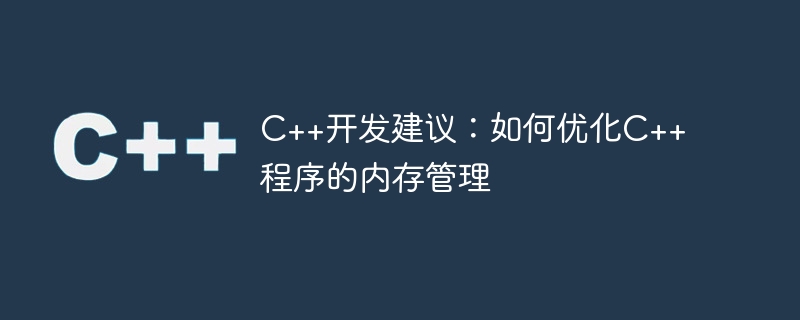
C Development Suggestions: How to Optimize the Memory Management of C Programs
- Introduction
As a high-performance programming language, C’s memory management is The impact on program performance is very important. Good memory management can improve the performance and stability of your program while avoiding memory leaks and memory fragmentation problems. This article will introduce some practical tips and suggestions for optimizing memory management of C programs to help developers better understand and apply memory management.
- Using smart pointers
In C, smart pointers are a convenient tool for managing dynamically allocated memory. Through smart pointers, developers can avoid manual memory management and reduce the risk of memory leaks. The standard library provides several smart pointer types, such as std::shared_ptr and std::unique_ptr. Developers can choose the appropriate type according to the actual situation. The use of smart pointers can simplify the memory management of the program and improve the readability and stability of the code.
- RAII (resource acquisition is initialization)
RAII is an important programming technology that can help developers effectively manage resources in the program. In C, RAII is often used to manage dynamically allocated memory, file handles, database connections and other resources. Through RAII, the life cycle of the resource is bound to the life cycle of the object, which ensures that the resource is released when the object leaves the scope. Developers can use RAII technology to avoid memory leaks and resource leaks, and improve program stability and maintainability.
- Use STL containers and algorithms
STL (Standard Template Library) provides a rich set of containers and algorithms that can help developers optimize memory management. For example, using std::vector instead of dynamic arrays can reduce the number of memory allocation and release times and improve the efficiency of memory management. At the same time, STL algorithms provide various efficient algorithm implementations, which can reduce the complexity of manual memory management and improve program performance and maintainability.
- Avoid overuse of dynamic memory allocation
Dynamic memory allocation is an expensive operation and overuse should be avoided as much as possible. In programming, you should consider using objects allocated on the stack or statically allocated arrays instead of dynamic memory allocation to reduce memory management overhead. If dynamic memory allocation must be used, the number of memory allocations and releases should be minimized to avoid frequent memory fragmentation problems.
- Reasonable use of memory pool
The memory pool is a technology that optimizes memory management and can improve the efficiency of memory allocation and release. Through the memory pool, you can pre-allocate memory blocks of a certain size and reuse these memory blocks during program running to avoid frequent memory allocation and release operations. Developers can use existing memory pool libraries or implement their own memory pools based on actual needs to optimize the memory management of the program.
- Use manual memory management with caution
Manual memory management is a complex and error-prone operation and should be used with caution. In C, developers can use tools such as smart pointers to avoid manual memory management and reduce the risk of memory leaks and access to illegal memory. If manual memory management must be used, developers should carefully check the logic of each memory allocation and deallocation to ensure that memory problems do not occur.
- Summary
Optimizing the memory management of C programs is crucial to program performance and stability. By rationally using smart pointers, RAII technology, STL containers and algorithms, avoiding excessive use of dynamic memory allocation, and rationally using memory pools, developers can effectively optimize the memory management of the program and improve the performance and stability of the program. At the same time, careful use of manual memory management can avoid the risk of memory leaks and access to illegal memory. We hope that the suggestions and techniques introduced in this article can help developers better optimize the memory management of C programs and improve programming level and software quality.
The above is the detailed content of C++ development advice: How to optimize memory management of C++ programs. For more information, please follow other related articles on the PHP Chinese website!






